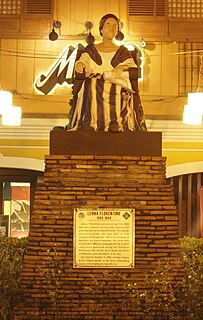 W
WȘtefan Aurel Baciu was a Romanian and Brazilian poet, novelist, publicist and academic who lived his later life in Hawaii. A precocious, award-winning, young author in interwar Romania, he was involved in editing several literary magazines. Attracted into left-wing democratic politics and the Social Democratic Party (PSDR), he camouflaged his views while working for the fascist press under dictatorial regimes, but returned in 1944 to manage the PSDR's Libertatea newspaper. Witnessing first-hand the gradual communist takeover, Baciu managed to have himself assigned to a diplomatic posting in Switzerland, and ultimately defected in 1948. A resident and then citizen of Brazil, and a traveler throughout Latin America, he wrote works in Portuguese, Spanish, English and German, as well as in his native Romanian.
 W
WAntonia Darder is an American scholar, artist, poet and activist. She holds the Leavey Presidential Endowed Chair in Ethics and Moral Leadership in the School of Education at Loyola Marymount University. She also is Professor Emerita of Educational Policy, Organization, and Leadership at the University of Illinois at Urbana-Champaign.
 W
WLeona Florentino was a Filipino poet in the Spanish and Ilocano languages. She is considered as the "mother of Philippine women's literature" and the "bridge from oral to literary tradition".
 W
WAntonio Lo Frasso was a Sardinian poet, writer and soldier. He was the author of Los diez libros de Fortuna de Amor, a work mentioned by Miguel de Cervantes in Don Quixote and edited in London by the lexicographer Pedro Pineda who considered valuable this work for his kindness, elegance and spirit.
 W
WGabriel Pereira de Castro (1571-1632) was a Portuguese priest, lawyer and poet.
 W
WGil Vicente, called the Trobadour, was a Portuguese playwright and poet who acted in and directed his own plays. Considered the chief dramatist of Portugal he is sometimes called the "Portuguese Plautus," often referred to as the "Father of Portuguese drama" and as one of Western literature's greatest playwrights. Also noted as a lyric poet, Vicente worked in Spanish as much as he worked in Portuguese and is thus, with Juan del Encina, considered joint-father of Spanish drama.
 W
WJoseph Zatrillas Vico,. He was a poet, writer, and politician. He was born to a noble Sardinian family when the kingdom of Sardinia was part of the Spanish crown.